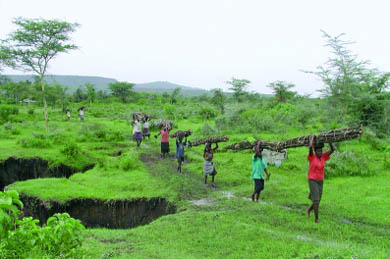Contact Us

LEDEC CORE PROGRAM AREAS
LEDEC CORE PROGRAM AREAS
LEDEC is mandated to carry out activities in 6 main program areas, as here under: 1. Natural Resources Conservation and Climate Change Adaptation
We are working with various stakeholders to address natural resources (land, water, plants, animals, sunlight, air, minerals, coal, natural gas, oil and mountains) through ecological conservation,Climate Change Adaptation mechanisms like agriculture, forest and watershed management, biodiversity conservation, water resources/fisheries, Water, Sanitation and Hygiene (WASH), health, energy,transportation and urbanization. We address bio-diversity, ecosystems, wetlands, forest destruction, extinction of water bodies, flora and fauna and natural heritage sites, carbon emissions and pollution to achieve the UN Sustainable Development Goals by 2030. We do this as we follow the set policies for green economy in accordance with the Rio Principles. We promote and follow-up adoption and adaptation of low carbon and efficient technologies in all public and private sector projects / investments.
2. Land, Shelter, Waste Management and Clean Energy
We mobilize communities on land rights, productivity and efficient and effective utilization through land scaping, surveying, mapping,titling and registration. We empower communities on waste management and recycling, urbanization,transportation, use of locally available and environmentally friendly construction materials like Interlocking Stabilized Soil Blocks (ISSB), briquettes, energy saving cook stoves, clean energy (solar), etc.using appropriate technologies in both urban and rural settings. We supported 320 women at DANIDA estates Jinja Uganda housing project to acquire freehold land titles/certificates on their land.
3. Sustainable Agriculture and Livelihood
We closely work with communities in agriculture, fisheries and animal husbandry with modern technology to address poverty, drought, food insecurity, malnutrition and unemployment affecting people through formation of Community Driven livelihood projects in farming, livestock, fishing, poultry and other economic empowerment programs. Communities are supported with skills and equipment in modern, affordable and appropriate technologies in fertilizer production, selecting quality seeds, planting, caring, irrigation, harvesting, storage, marketing access to micro-credits, insurance and training services sustainably.
4. Water, Sanitation and Hygiene (WASH) and Humanitarian Aid
Water supplies, reliability, and temperature are directly affected by a changing climate; indirect effects include land-use changes, agricultural intensification, water quality, groundwater decline, and increased waterborne diseases. We empower communities to have clean and safe water, improved sanitation and hygienic conditions through WASH Committees. We carry out training on sustainable water usage and management to address unhygienic related illnesses e.g. cholera, dysentery, salmonella, typhoid fever, diarrhea, malaria, etc. We aim at increasing demand for potable household water, multiple use systems and irrigation systems for improved food production and livelihood. We also support communities before,during and after disasters and emergencies like floods, conflicts, landslides, rainstorms, drought, etc.
5. Education, Health and Social Services Provision
We promote quality, accessible and affordable education, health and other social services at all levels among community members for sustainable development. We work with schools at all levels both formal and informal like Early Childhood Development (ECD) Centres (nursery schools), Primary, Secondary, High Schools, Colleges, Universities, Business and Vocational Training Centres and Functional Adult Literacy (FAL) to equip them with technical, physiological, social, economic and life skills. Additionally, we also work with health centres, hospitals and other social services providers to empower women, girls, boys and marginalized social groups to become more productive Change Agents in development.
6. Research,Advocacy, Social Accountability and Justice
We conduct consultancies, research, lobbying, advocacy and offer legal, human rights awareness and psycho social support to victims of abuse, exploitation like children, women, youth, the poor men and other vulnerable social groups affected by land and property grabbing, torture, abuse, neglect, marginalization and other human rights abuses. We implore governments to come up with laws, policies and ordinances and implement them e.g. on Climate Change Adaptation, land, housing or settlements, waste management and recycling, education, health, environmental protection, WASH, livelihood, human rights etc. We also promote democracy, social accountability, participation, patriotism, peace, equity and justice for all. We empower communities to increase their voice by understanding and being better able to exercise their rights to organize, to information, to public participation and to equal justice. We look forward to seeing more responsiveness from governments and private sector to their interests; and increase their influence and benefit from the policies and legislation of governments on resource allocation, and the policies and practices of the private sector. Additionally, we want to see more people benefit from increasingly accountable and transparent governments and private sector because they are better able to demand transparency, fulfillment of pro-poor promises and respect for citizens’ rights and the rule of law.